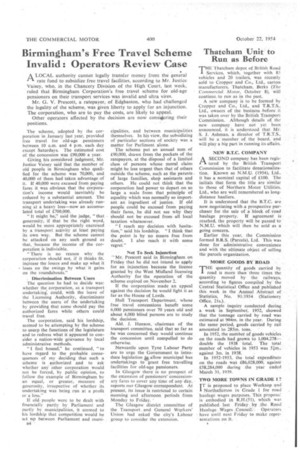Birmingham's Free Travel Scheme Invalid : Operators Review Case
Page 38

If you've noticed an error in this article please click here to report it so we can fix it.
A LOCAL authority cannot legally transfer money from the general rate fund to subsidize free travel facilities, according to Mr. Justice Vaisey, who, in the Chancery Division of the High Court; last week, ruled that Birmingham Corporation's free travel scheme for old-age pensioners on their transport services was invalid and ultra vires.
Mr. G. V. Prescott, a ratepayer, of Edgbaston, who had challenged the legality, of the scheme, was given liberty to apply for an injunction. The corporation, who are to pay the costs, are likely to appeal.
The scheme, adopted by the corporation in January last year, provided free travel for old-age pensioners between 10 a.m. and 4 p.m. each day except Saturdays. The estimated cost of the concession was £90,000 a year.
Giving his considered judgment, Mr. Justice Vaisey said that the number of old people in Birmingham who qualified for the scheme was 70,000, and 40,000 of them had taken advantage of it. If 40,000 were excused from paying fares it was obvious that the corporation's income would inevitably be reduced by a substantial amount. The transport undertaking was already running at a heavy loss—now an accumulated total of £700,000.
"It might be," said the judge, that generosity, if that be the right word, would be more appropriately exercised by a transport activity at least paying its own way. But the scheme cannot be attacked on any such ground as that, because the, income of the corporation is indivisible.
"There is no reason why the corporation should not, if it thinks fit, increase the losses and make up what it loses on the swings by what it gains on the roundabouts."
, Discrimination Between Users
The .questionhe had to decide was: whether the corporation, as a transport undertaking, could, with the leave of the Licensing Authority, discriminate between the users of the undertaking by providing that some should pay the authorized fares while others could travel free.
The corporation, said his lordship, seemed to be attempting by the scheme to usurp the functions of the legislature and to redress what it appeared to consider a nation-wide grievance by local administrative methods.
"I feel bound," he continued, "to have regard to the probable consequences of my deciding that such a scheme is authorized and to ask whether any other corporation would not be forced, by public opinion, to follow the example of Birmingham by an equal, or greater, measure of generosity, irrespective of whether its undertaking was being run at a profit or a loss."
If old, people were to be dealt with financially partly by Parliament and partly by municipalities, it seemed to his lordship that competition would be set up between Parliament and muni B4 • cipalities, and between municipalities themselves. In his view, the subsidizing of particular sections of society was a matter for Parliment alone,
The scheme put an annual sum of £90,000, drawn from the pockets of the ratepayers, at the disposal of a limited class of persons whose moral claim might be less urgent than that of others outside the scheme, such as the parents of large families, shop assistants and others. He could not think that the corporation had power to depart on so large a scale from that principle of equality which was normally so important an ingredient of justice. If old people could be excused from paying their fares, he did not see .why they should not be excused from all local taxation whatsoever.
"I reach my decision with hesitation," said his lordship. "I think that the point is by no means free from doubt. I also reach it with some regret."
Not To Seek Injunction " Mr. Prescott said in Birmingham on Friday that he did not intend to apply for an injunction because the licence granted by the West Midland licensing Authority for the operation -of the scheme expired on November 2.
If the corporation made an appeal against the decision he would fight it as far as the House of Lords.
Hull Transport Department, whose free travel concessions benefit some 6,000 pensioners over 70 years old and about 4,000 blind persons are to study the decision.
Ald. J. Henson, chairman of the transport committee, said that so far as he was concerned they would continue the concession until compelled to do otherwise.
Newcastle upon Tyne Labour Party are to urge the'Government to introduce legislation 19, allow municipal bus undertakings to grant free travelling facilities for old-age pensioners.
In Glasgow there is no prospect of the extension of pensioners' concessionary fares to cover any time of any day, reports our Glasgow correspondent, At present, its issue is restricted to certain morning and afternoon periods from Monday to Friday.
The Glasgow district committee of the Transport. and General Workers' Union had asked the city's Labour group to consider the extension.




































































































